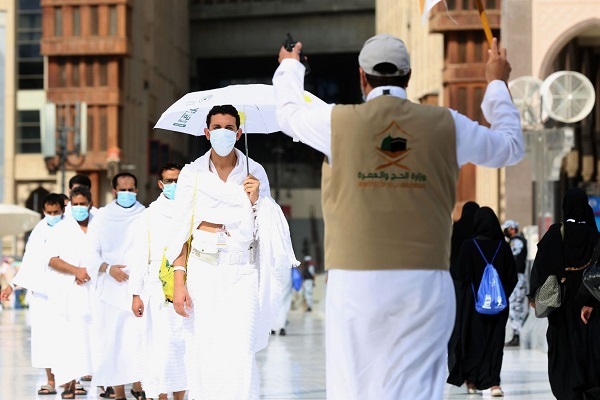AhlulBayt News Agency (ABNA): Worshippers at the Grand Mosque and the Prophet’s Mosque are advised to wear facemasks as a precaution after the kingdom detected the JN.1 variant of COVID-19.
Saudi authorities have called on worshippers at Islam’s two holiest sites to wear facemasks as a precautionary measure, days after the kingdom announced the detection of a new variant of COVID-19.
The Saudi General Directorate of Public Security said in a social media post that wearing masks at the Grand Mosque and the Prophet’s Mosque and their courtyards would help prevent the transmission of diseases, Saudi media outlets reported on Sunday.
The kingdom’s Public Health Authority said it had identified the local spread of the JN.1 variant of COVID-19, which accounted for 36 percent of the cases in the country. However, it said there was no cause for alarm, as the variant had not led to any increase in admissions to intensive care units.
Saudi Arabia has eased pandemic-related restrictions, allowing different businesses and activities to resume. Earlier this year, around 1.8 million Muslims performed the annual Hajj pilgrimage in Saudi Arabia for the first time in three years, after the pandemic had limited the number of pilgrims.
Millions of Muslims from inside and outside Saudi Arabia visit the Grand Mosque, Islam’s most sacred site, in Mecca every year to perform Umrah or minor pilgrimage and offer prayers. Many of them also travel to the Prophet’s Mosque in Medina.
Saudi Arabia expects around 10 million foreign Muslims to perform Umrah during the current season, amid facilities for overseas pilgrims.
The World Health Organisation (WHO) designated JN.1 as a “variant of interest” earlier this month, due to its rapid spread around the world. The UN agency said the additional global public health risk posed by JN.1 was “currently evaluated as low”, based on the available data. It added that current vaccines still offered protection against severe disease and death from JN.1 and other circulating variants.
JN.1 is a descendant of Omicron and its symptoms appear to be similar to other variants, such as having a sore throat followed by congestion, according to specialists.
......................
End/ 257

